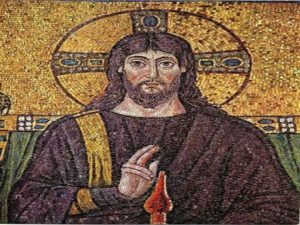Doubting the Power of God
24 August 2022Last Sunday, on the occasion of the Gospel reading, we saw external factors as the cause of the secularization of the body of the Church. Chief among these were authoritarianism, worldliness and distortion of the revealed truth. Today’s reading complements this and helps us to understand how to identify other dangers, internal this time, which also lead to the Church declining from being the body of Christ into being a fixture of this world. It’s a terrible thing to betray the divine founder of the Church by subscribing to the view that ensuring our salvation and bringing us to sanctity, isn’t the sole reason for the Church’s existence in the world, but that, on occasion, it can serve other purposes, more shallow, more imperfect and of limited duration.
The reason why these Gospel extracts are read isn’t to sound alarm bells or to breed fear in the souls of those living spiritually, especially those who have the responsibility for Church matters, and make them give up on their efforts and actions. Nor are the extracts a cause for mutual condemnation, strife, and divisions between spiritual brothers and sisters in the context of some sort of critique. The Gospel unites and its texts are there to warn us about spiritual dangers so that we’ll be vigilant in repelling all temptations, particularly as regards the perspective of unity among us.
‘Faithless and perverse generation’
A much-troubled father brought his beloved son to Christ, in great distress. The reason? The boy was tormented by a demon and, even though the father had asked Christ’s disciples to heal him, they’d been unable to do so. They didn’t refuse. They tried but couldn’t. These were the same people Jesus had just sent off in twos on a trial expedition, during which they’d overpowered demons and performed a multitude of miracles. Now they failed, much to the detriment of their reputation.
How did Christ react? With an exclamation which betrays his frustration and which might perhaps be considered disproportionate, and even beside the point. ‘Faithless and perverse generation, how long am I to be with you? How long am I to bear with you? Bring him here”. He calls out all those who heard him as being a ‘faithless and perverse generation’. What do these designations signify? Clearly not that those who were present, including his own disciples, weren’t properly directed towards the true God. He obviously wasn’t calling them atheists. The terms ‘faithless and perverse’ refer to the spiritual state in which there’s a basic acceptance of the truth of the faith, but not complete trust in and dependence on God the Father.
These designations were aimed at those who had lived through any number of spiritual states and experiences but continued not to ‘surrender to God’; that is they doubted his power, his providence and his divine love and they had their reservations. This is the approach which is expressed by the thinking: ‘Yes, in those days God provided, protected, disposed and acted, but can he, will he do the same today?’. In essence, it’s doubt not of God’s existence, but of his ability to act. Not whether there’s a God but what kind of God he is and to what extent he’s God..
‘Why were we unable?’
In the face of this situation which had developed, the ashamed disciples came not to ask ‘Where did we go wrong?’ or to seek forgiveness. They came and asked about the cause of their failure, not with any clear desire for spiritual maturity and rectification, but out of obvious fear that they’d lost the gift they’d previously been proud of, that of ‘authority over unclean spirits’.
What was the disciples’ mistake? The fact that they’d become accustomed to performing miracles. They didn’t work miracles with constant gratitude for the divine power which had been granted them as a gift; instead, they thought it their own ability, even if acquired, and clearly referenced it to themselves. They’d become used to exercising the gift and didn’t realize how important it was, why it had been given to them and by whom. This was unacceptable spiritual familiarity, which Christ wished to remove from them by speaking about ascetic vigilance, and increase of prayer and fasting. He spoke in a constructive manner, without upsetting them further, which is why, though he’d earlier chastised them, he now calmed them, not wishing to cause them unnecessary dejection. Of course, while he was reassuring them, encouraging them and speaking gently to them, he still spelt out the cause of their failure in no uncertain terms: ‘your lack of belief’. What he means here by ‘lack of faith’ is presumption, habit, likely arising from mere repetition. Instead of glorifying in God’s providence, they were drawn into mechanical actions and spiritual complacency.
My brothers and sisters, over the course of the history of the Church, many people have fallen into such tempting thoughts. They’ve doubted God’s continuing commitment to our salvation by sustaining his Church and have instead taken their own actions to ‘save the Church’, in accordance with their own views. Or they’ve become accustomed to the miracle of the Church, and through over-familiarity have ceased to glorify divine majesty and now languish in a feeling of routine. Both lukewarm faith and habit are both characterized as lack of faith and perverseness, because, as internal, subtle warfare, they bring about the same result, if they prevail: an absence of Orthodox orientation in faith and relegation of the Church to that status of yet another entity on the historical stage. In both instances, there’s a denigration of the Church’s claim to be the self-defined body of Christ- of Christ who extends throughout the ages- and to be the center of healing for those whose destination is the kingdom of heaven.







